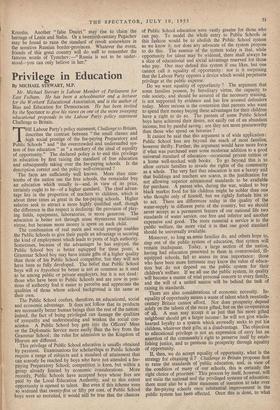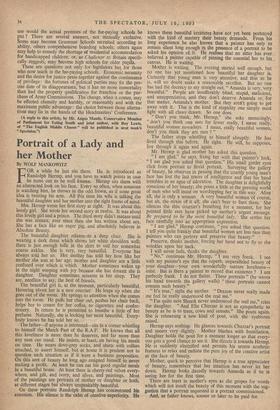Privilege in Education
By MICHAEL STEWART, M.P.
Mr. Michael Stewart is Labour Member of Parliament for East Fulham. He has been a schoolmaster and a lecturer for the Workers' Educational Association, and is the author of Bias and Education for Democracies. He has been invited by the Spectator to give his views on one of the more sweeping educational proposals in the Labour Party policy statement Challenge to Britain.
HE Labour Party's policy statement, Challenge to Britain, describes the contrast between " the small classes and .high social prestige of the fee-paying Preparatory and Public Schools " and " the overcrowded and understaffed sys- tem of free education " as " a mockery of the ideal of equality of opportunity." The declared policy is to end this privilege in education by first raising the standard of free education and subsequently taking over the fee-paying schools. Is the description correct and the policy well-conceived ?
The facts are sufficiently well known. More than nine- tenths of the nation use the free schools, the remainder buy an education which usually is—and, in view of its price, certainly ought to be—of a higher standard. The chief advan- tage lies in the proportion of teachers to children, which is about three times as great in the fee-paying schools. Higher salaries seek to attract a more highly qualified staff, though the difference in this respect is declining; the provision of play- ing fields, equipment, laboratories, is more generous. The education is better not through some mysterious traditional virtue, but because more money is spent on each child.
The combination of real merit and social prestige enables the Public Schools to give their pupils an advantage in securing the, kind of employment which leads to posts of high authority. Sometimes, because of the advantages he has enjoyed, the Public School boy is better equipped for these posts; a Grammar School boy may have innate gifts, of q higher quality than those of his Public School competitor, but they will not have been so fully developed. The belief that Public School boys will ex hypothesi be better is not as common as it used to be among public or private employers, but it is not dead: those who have been to Public Schools and are now in posi- tions of authority find it easier to perceive and appreciate the qualities of those whose school background is the same as their own.
The Public School confers, therefore, an educational, social and economic advantage. It does not follow that its products are necessarily better human beings than the rest of the nation; indeed, the fact of being privileged can damage the qualities of sympathy and understanding and weaken the social con- science. A Public School boy gets into the Officers' Mess or the Diplomatic Service more easily than the boy from the Grammar School: the rules for admission to the Kingdom of Heaven are different.
This privilege of Public School education is usually obtained by payment. Examinations for scholarships to Public Schools require a range of subjects and a standard of attainment that can scarcely be reached by boys who have not attended a fee- paying Preparatory School; competition is keen, but within a group already limited by economic considerations. More recently, Public Schools have accepted boys whose fees are paid by the Local Education Authority, and to this extent opportunity is opened to talent. But even if this scheme were so widened that twenty-five or fifty per cent. of Public School boys were so recruited, it would still be true that the chances of Public School education were vastly greater for those who can pay. To model the whole entry to Public Schools in this fashion would be to abolish the Public School system as we know it; nor does any advocate of the system propose' to do this. The essence of the system today is that, while opportunity for talent may be widened, there shall always be a slice of educational and social advantage reserved for those who pay. One may defend this system if one likes, but one cannot call it equality of opportunity: nor is it surprising that the Labour Party opposes a device which would perpetuate privilege at the public expense.
Do we want equality of opportunity ? The argument that some families possess, by hereditary virtue, the capacity to rule society, and should be assured of the necessary training, is not supported by evidence and has few avowed defenders today. More serious is the contention that parents who want to spend their money buying these advantages for their children have a right to do so. The parents of some Public School boys have achieved their desire, not easily out of an abundant income, but by painful saving : are they not more praiseworthy than those who spend on luxuries ?
It cannot be said that this argument is of wide application: Public School fees are beyond the reach of most families, however thrifty. Further, the argument would have more force if what was purchased were some moderate addition to a good universal standard of education—occasional private tuition or a home well-stocked with books. To go beyond this is to allow certain families to invade the rights of the community as a whole. The very fact that education is not a luxury and that buildings and teachers are scarce, is the justification for not allowing superior educational standards to be available for purchase. A parent who, during the war, wished to buy black market food for his children might be nobler than one who thought only of himself, but we rightly forbade him so to act. There are differences today in the quality of the water-supply in different parts of the country, but we should never accept as a permanent feature of our national life two standards of water service, one free and inferior and another expensive and good. The more essential a service is to the public welfare, the more vital it is that one good standard should be universally available.
Moreover, so long as some families do, and others hope to, step out of the public system of education, that system will remain inadequate. Today, a large section of the nation, having had education presented to them in overcrowded, ill- equipped schools, fail to assess its true importance: those who have been more fortunate may know the value of educa- tion but do not depend on the public system for their children's welfare. If we all use the public system, its quality will become a matter of vital personal concern to every family, and the will of a united nation will be behind the task of raising its standards.
There are also considerations of economic necessity. In- equality of opportunity means a waste of talent which twentieth- century Britain cannot afford. Nor does prosperity depend solely on the talents of the more gifted, but on the co-operation of all. A man may accept it as just that his more gifted neighbour should get a larger income: he will not give whole- hearted loyalty to a system which avowedly seeks to put his children, whatever their gifts, at a disadvantage. The objection to educational privilege is not an expression of envy but an assertion of the community's right to preserve itself by estab- lishing justice, and to promote its prosperity through equality of opportunity.
If, then, we do accept equality of opportunity, what is the strategy for obtaining it ? Challenge to Britain proposes first to raise the standards of "public education, and, in view of the condition of many of our schools, this is certainly the right choice of priorities. This process by itself, however, will not unite the national and the privileged systems of education; there must also be a clear statement of intention to take over the fee-paying schools once substantial improvement in the public system has been effected. Once this is done, to what use would the actual premises of the fee-paying schools be put ? There are several answers, not mutually exclusive. Some may become Grammar Schools recruited according to ability, others comprehensive boarding schools; others again may help to remedy the shortage of residential accommodation for handicapped children, or, as Challenge to Britain specifi- cally suggests, may become high schools for older pupils.
These are questions not only for legislators but for those who now teach in the fee-paying schools. Economic necessity and the desire for justice press together against the continuance of privilege: the fortunes of political parties may fix the pre- cise date of its disappearance, but it has no more immortality than had the property qualification for franchise or the pur- chase of Army Commissions. The change, when it comes, may be effected clumsily and harshly, or reasonably and with the maximum public advantage: the choice between those alterna- tives may lie in the hands of the Headmasters' Conference.
(A reply to this article, by Mr. Angus Maude, Conservative Member of Parliament for Ealing South and joint author, with Roy Lewis, of "The English Middle Classes" will be published in next week's " Spectator.")



































 Previous page
Previous page